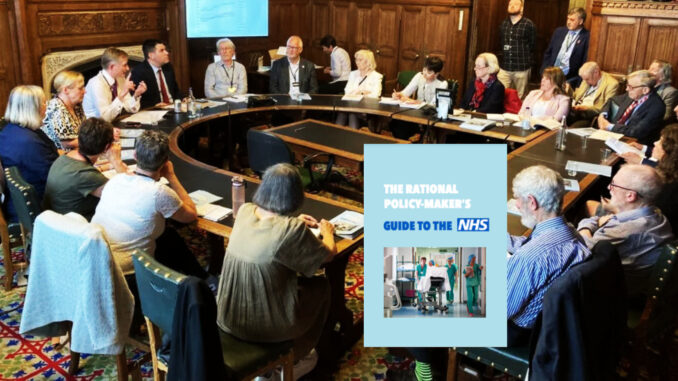
This article first appeared in Public Sector Focus (May-June 2023, Issue 46) to which Keep Our NHS Public is also a regular contributor. The important report The Rational Policy-maker’s Guide to the NHS was launched on 4 July in the House of Commons at a very well-attended meeting of MPs and members of the Lords from six political parties. This article summarises the evidence that the model on which the NHS was founded is sound and makes economic as well as political sense – an important and timely message at the 75th anniversary of the NHS, a model that is under escalating attack from right wing sources.

Mark E Thomas is the founder of The 99% Organisation. He is a Visiting Professor at IE Business School. He is the author of several works – 99%, The Complete CEO, and The Zombie Economy. Here Professor Thomas sets out his new research on NHS funding and argues that the idea that we can’t afford the NHS is a dangerous myth that disadvantages all of us.
A project jointly run by the 99% Organisation, Keep Our NHS Public, the National Health Action Party and others has been examining the extent, if any, to which the arguments against funding the NHS in line with need have merit. It concluded, based on international benchmarking and modelling of the interplay between the health and economic performance of the UK, that these arguments are both factually unfounded and illogical – and that the damage the resulting policies could do to the health of the nation and its economy is enormous.
When the National Health Service was launched in 1948, it was arguably the single most important social development in 20th Century Britain, establishing a foundational cornerstone of this country’s economic and societal progress since the end of the Second World War, creating a shining example of community cohesion and providing a moral beacon for the rest of the world. In the following 75 years, the NHS has cared for the physical and mental health of tens of millions of Britons of every colour and every creed, truly from cradle to grave. It has led the way in world-beating pioneering surgery, tackled sickness and disease in all its forms and improved the life chances of the most vulnerable members of our society. It is an indispensable part of the glue that binds us all together as a civilised nation.
The challenge for UK Healthcare
But now, 75 years later, the NHS, like other public services, is struggling to meet both public expectations and its own performance standards. And some politicians on the right are calling for radical reform – by which they mean privatisation and replacement of funding by progressive taxation with funding from increased payments and some form of insurance-based system.
Sajid Javid, the former Health Secretary, for example, is on record as saying, “the 75-year-old model of the NHS is unsustainable. And unless it is radically reformed, the principles on which it was founded cannot survive much longer.” He told the Conservative Party conference that “We shouldn’t always go first to the state – what kind of society would that be? Health and Social Care: it begins at home. It should be family first, then the community, then the state.”
Assessing the claims
Javid’s claims are factually unfounded because independent international benchmarking – eg by the Commonwealth Fund who has shown that (when well-funded) the NHS was the best system in the developed world; it was also the most efficient.
Even as recently as 2017, the NHS was clinging on to the position of best overall, although by that time, its performance had begun to slip.
No other system has the same track record as the NHS. Javid’s suggestion that the NHS model is no longer appropriate for the 21st century is directly contradicted by the facts.
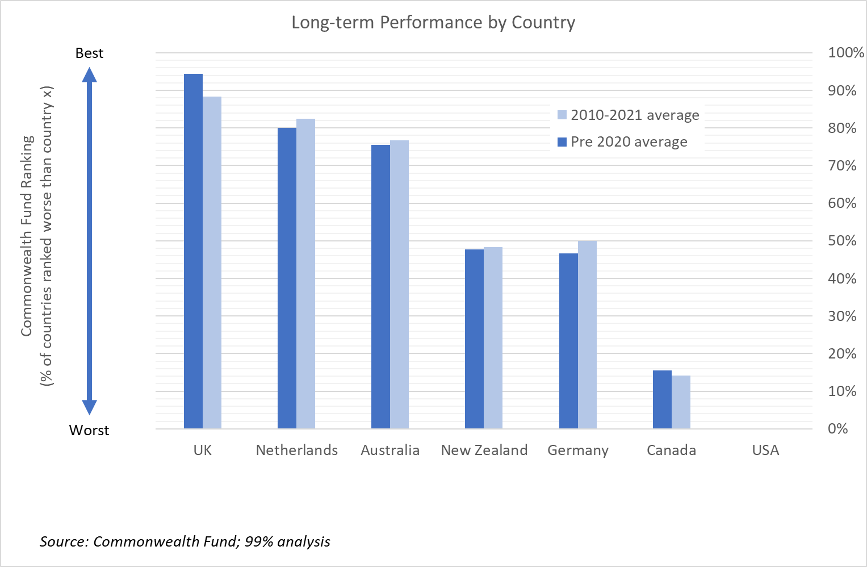
What the facts also show is that, from 2010 onwards, the funding model of the NHS changed sharply: whereas other countries continued to fund their systems in line with the healthcare needs of the population, the UK government began to reduce the proportion of GDP spent on the NHS.
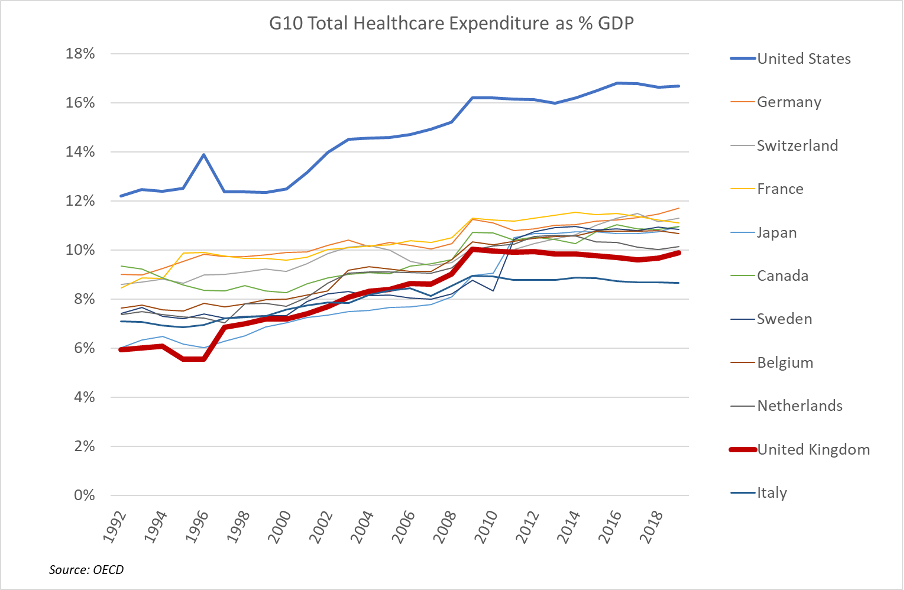
The result was inevitable: we now have fewer doctors and nurses and fewer hospital beds than almost all our peers, and the service levels we experience have dropped dramatically. The NHS is no longer performing as a world-class healthcare system – and this is directly attributable to the impact of 13 years of underfunding.
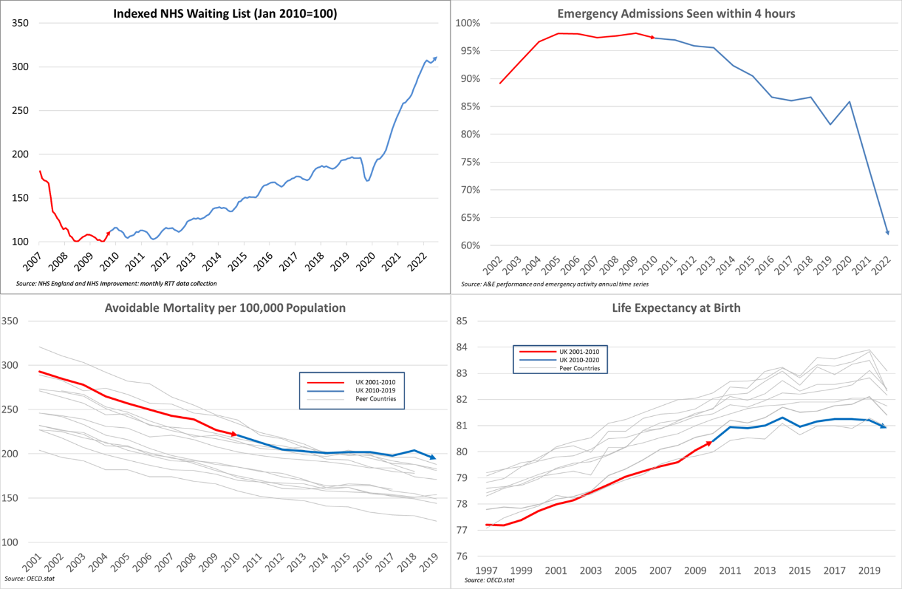
Fixing the problem
The obvious answer to this problem is to end the underfunding. But here the detractors make another unfounded and illogical claim: that with an aging population, funding the NHS will no longer be affordable; we have no option but to change to a different model.
The claim is unfounded because combining the Office for Budget Responsibility data on health spending by age and the Office for National Statistics population forecasts shows no such issue.
It is illogical because if the NHS, the cheapest system in the developed world, is unaffordable, then any proven system is unaffordable. A change to an alternative model would bring either much higher spending or much worse health outcomes or, like the US system, a combination of the two.
In fact, unaffordability works the other way around. If we have worse healthcare, we have a less healthy population. A less healthy population is less productive. And a less productive population produces lower economic output. Our analysis shows that if the NHS fails, the economy will fail with it.
It is the current government’s policy of underspending which is unaffordable.
The OECD long-term growth forecasts show that by the year 2060, the UK should expect to have a GDP of around £3.8 trillion (vs around £2.2 trillion today); current government health policies would cause a result far worse than the OECD forecasts – they would be economically ruinous for the UK.
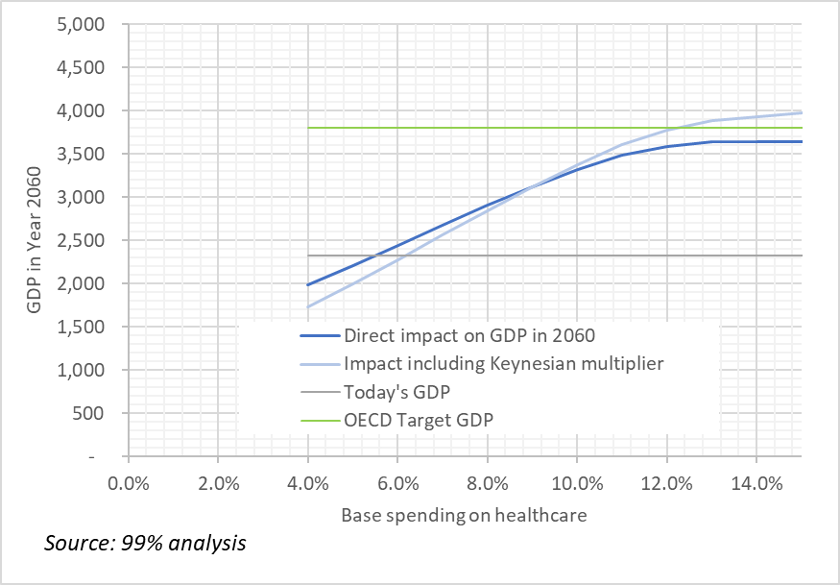
A rational policy, adjusting healthcare spending to meet population needs, would produce a spending profile of this form.
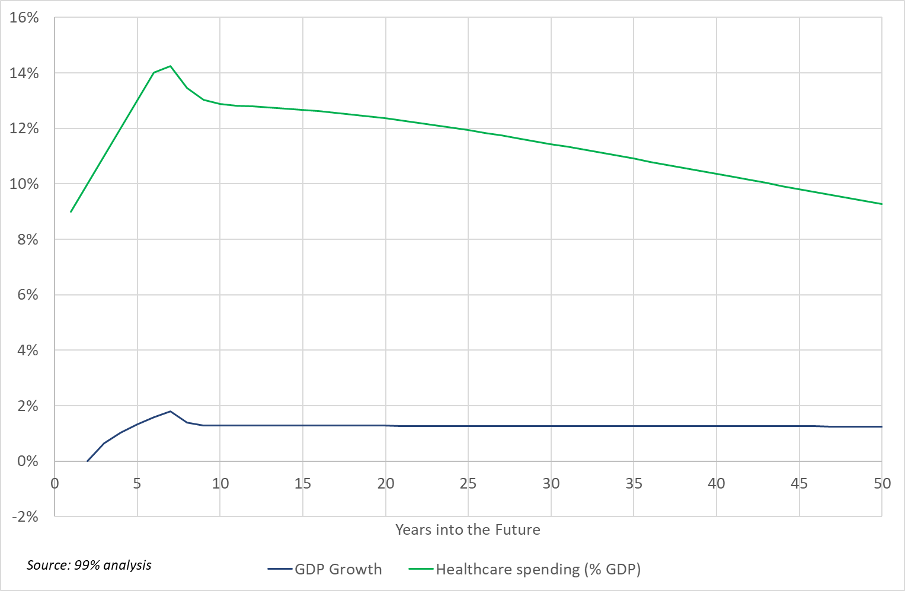
Note: This scenario assumes: 1) that NHS spending is adjusted to meet need; 2) that there is increased spending on prevention; and 3) that there are effective poverty reduction policies in place which, over time, reduce socially-determined morbidity.
The model shows a short-term spike in spending as capacity is rebuilt, rather as we saw take place in the years 1997-2009, followed by a return to a steady state spending of around 9% of GDP. And the resulting GDP in the year 2060 would hit the OECD target.
In summary, the NHS is under grave threat – unsustainable policies, justified by illogical narratives mean that it may even fail. And if it does, our economy will fail with it.
Recommended further reading includes:
Download the report: The Rational Policy-maker’s Guide to the NHS The 99% Organisation. July 2023
How does UK health spending compare across Europe over the past decade? Health Foundation. Oct. 2022
How does the NHS compare to the health care systems of other countries? Kings Fund Report. June 2023
Private sector can’t solve crisis in waits for NHS operations John Lister in the Lowdown. 26 May 2023
The NHS we want and need KONP leaflet available as pdf download or supply
More from Public Sector Focus

Totally the opposite. The NHS should be de-funded and NI contributes for the public slashed so they can take out private healthcare. The level of care and quality from the NHS has drastically decreased. Alongside – and I am going to be perfectly blunt and honest here – workers in the NHS taking the absolute mick out of sickness policies so they don’t work for nearly 18 months and receive full pay for the large majority of that time, all while working on a certain ‘adult’ site. Waste and allowing people to get away with things is rife and simply wouldn’t be tolerated in a private organisation – yet it is within the NHS. Time to go.
I do know a single person in the NHS that has taken 18 months sick leave on full pay and don’t know anyone working on an adult site during that period. Even if it happened it can happen in the private sector too I can assure that. The vast majority of public and private workers do no have that level of sickness benefit. But I agree that the NHS is heavily unaffordable for the UK at the current state. The UK cannot afford to give up the NHS but it is rapidly running out of choice. The future maybe that more private sector services will need to take over a reduced NHS. Leaving an NHS that is capped at level of resource use for each person. Procurement at the NHS may need to be more flexible to allow cheaper competition. The most expensive treatments may be discounted rather than free on the NHS. Unless the economy is run more sensibly for the long term rather than short term politics at each cycle that is dependent on how sensible the PM is, the NHS at its current state will not survive. It’s likely the NHS will be forced to change..not a matter of if but when